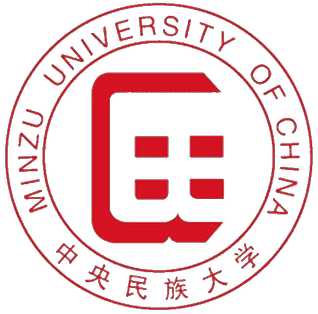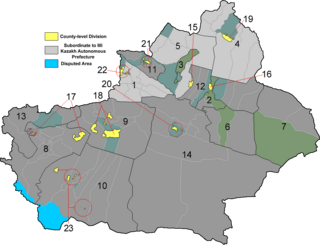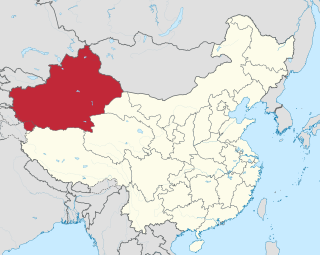Related Research Articles

The Uyghurs, alternatively spelled Uighurs, Uygurs or Uigurs, are a Turkic ethnic group originating from and culturally affiliated with the general region of Central and East Asia. The Uyghurs are recognized as native to the Xinjiang Uyghur Autonomous Region in Northwest China. They are one of China's 55 officially recognized ethnic minorities. The Uyghurs are recognized by the Chinese government as a regional minority and the titular people of Xinjiang.

Ürümqi, formerly known as Dihua, is the capital of the Xinjiang Uyghur Autonomous Region in the far northwest of the People's Republic of China. Ürümqi was a major hub on the Silk Road during China's Tang dynasty and developed its reputation as a leading cultural and commercial center during the Qing dynasty in the 19th century.

The Chinese Academy of Sciences is the national academy for the natural sciences of the People's Republic of China. It has historical origins in the Academia Sinica during the Republican era and was formerly also known by that name. Collectively known as the "Two Academies (两院)" along with the Chinese Academy of Engineering, it functions as the national scientific think tank and academic governing body, providing advisory and appraisal services on issues stemming from the national economy, social development, and science and technology progress. It is headquartered in Xicheng District, Beijing, with branch institutes all over mainland China. It has also created hundreds of commercial enterprises, Lenovo being one of the most famous.

Minzu University of China is a national public university in Haidian District, Beijing, China designated for ethnic minorities in China.

The Xinjiang Production and Construction Corps, also known as XPCC or Bingtuan, is a state-owned economic and paramilitary organization in China's Xinjiang Uyghur Autonomous Region (XUAR).
Xinjiang Agricultural University (XAU) is a higher education institution in Ürümqi, the capital of the Xinjiang Uyghur Autonomous Region, China. It specializes in courses and research relating to construction in agricultural contexts.

Xinjiang Medical University (XMU), formerly the Xinjiang Medical College, is a medical university in Ürümqi, the capital of the Xinjiang Uyghur Autonomous Region of the People's Republic of China. It was ratified by the National Ministry of Education in 1998 and entitled by Jiang Zemin.

Xinjiang University (XJU) is one of the major universities in the Xinjiang Uyghur Autonomous Region, People's Republic of China and is a national key university. Established in 1924 in Ürümqi, Xinjiang University is a comprehensive university with the highest academic level in Xinjiang, under Double First Class University Plan and former Project 211. It is a Chinese state Class B Double First Class University identified by the Ministry of Education.

Shihezi University is a public university located in Shihezi, Xinjiang, China. Founded in 1996, it is administered by the Xinjiang Production and Construction Corps (XPCC) and co-funded by the Ministry of Education under the Chinese state Double First Class University Plan and former "Project 211" for national key universities.

Xinjiang University of Finance and Economics is a university in Ürümqi, Xinjiang, China. Founded in 1950, it is the key institution for the study of economics. There is a total enrollment of more than 20,000 students. There are 1302 staff in total, including 750 full-time teachers, 36 professors and 215 associate professors. It ranks at 378th in China having an all-around score of 17.00.

The College of Traditional Chinese Medicine is a degree awarding college working as a subsidiary of the Xinjiang Medical University, is the only autonomous institution of a higher Chinese medicine study in Urumqi. On May 31, 1985 the State Education Commission sanctioned the amount for the construction of the college building. In 1986, a new hospital building's construction started for the "under construction" college. On April 17, 1987 the Xinjiang government merged the college under the administration of the Xinjiang Medical University.

Saifuddin Azizi, also known as Seypidin Azizi, Saif al-Dīn ʿAzīz, Saifuding Aizezi and Saifuding, was the first chairman of the Xinjiang Uyghur Autonomous Region of the People's Republic of China.

Xinjiang, officially the Xinjiang Uygur Autonomous Region (XUAR) and formerly romanized as Sinkiang, is a landlocked autonomous region of the People's Republic of China (PRC), located in the northwest of the country close to Central Asia. Being the largest province-level division of China and the 8th-largest country subdivision in the world, Xinjiang spans over 1.6 million square kilometres (620,000 sq mi) and has about 25 million inhabitants. Xinjiang borders the countries of Mongolia, Russia, Kazakhstan, Kyrgyzstan, Tajikistan, Afghanistan, Pakistan and India. The rugged Karakoram, Kunlun and Tian Shan mountain ranges occupy much of Xinjiang's borders, as well as its western and southern regions. The Aksai Chin and Trans-Karakoram Tract regions, both administered by China, are claimed by India. Xinjiang also borders the Tibet Autonomous Region and the provinces of Gansu and Qinghai. The most well-known route of the historic Silk Road ran through the territory from the east to its northwestern border.

Xinjiang Astronomical Observatory of the Chinese Academy of Sciences was known as Ürümqi Astronomical Observatory before it was renamed in January 2011.

The Xinjiang conflict, also known as the East Turkistan conflict, Uyghur–Chinese conflict or Sino-East Turkistan conflict, is an ongoing ethnic geopolitical conflict in what is now China's far-northwest autonomous region of Xinjiang also known as East Turkistan. It is centred around the Uyghurs, a Turkic ethnic group who constitute a plurality of the region's population.

The Xinjiang internment camps, officially called vocational education and training centers by the government of China, are internment camps operated by the government of the Xinjiang and the Chinese Communist Party Provincial Standing Committee. Human Rights Watch says that they have been used to indoctrinate Uyghurs and other Muslims since 2017 as part of a "people's war on terror", a policy announced in 2014. The camps have been criticized by the governments of many countries and human rights organizations for alleged human rights abuses, including mistreatment, rape, and torture, with some of them alleging genocide. Some 40 countries around the world have called on China to respect the human rights of the Uyghur community, including countries such as Canada, Germany, Turkey, Honduras and Japan. The governments of more than 35 countries have expressed support for China's government.

The Chinese government has committed a series of ongoing human rights abuses against Uyghurs and other ethnic and religious minorities in Xinjiang that is often characterized as genocide. Since 2014, the Chinese government, under the administration of Chinese Communist Party (CCP) General Secretary Xi Jinping, has pursued policies that incarcerated more than an estimated one million Turkic Muslims in internment camps without any legal process. This is the largest-scale detention of ethnic and religious minorities since World War II. Experts estimate that, since 2017, some sixteen thousand mosques have been razed or damaged, and hundreds of thousands of children have been forcibly separated from their parents and sent to boarding schools.

Rahile Dawut was a professor at Xinjiang University in China’s Xinjiang Uyghur Autonomous Region and is internationally recognized as an expert in Uyghur folklore and traditions. She has received awards and grants from China’s Ministry of Culture, and is the founder of a folklore institute. She is suspected of being held by state authorities at an undisclosed location. She was disappeared by the Chinese government in 2017 and has not been seen since.

Erkin Tuniyaz is a Chinese politician of Uyghur origin who is the current chairman of Xinjiang Uyghur Autonomous Region, in office since 30 September 2021. He is an alternate member of the 19th Central Committee of the Chinese Communist Party.